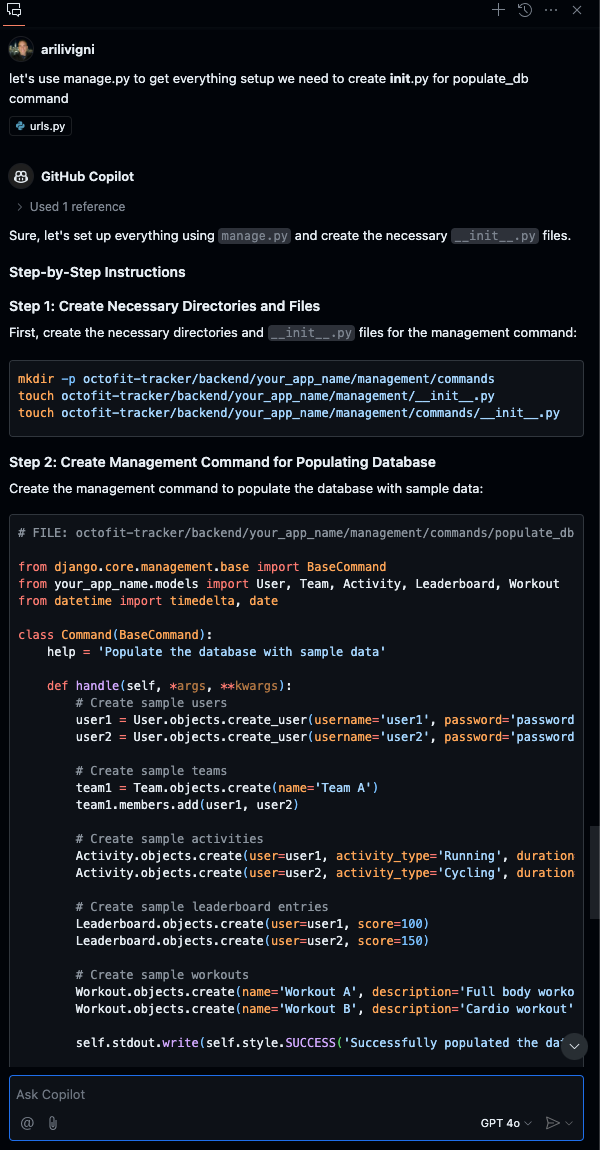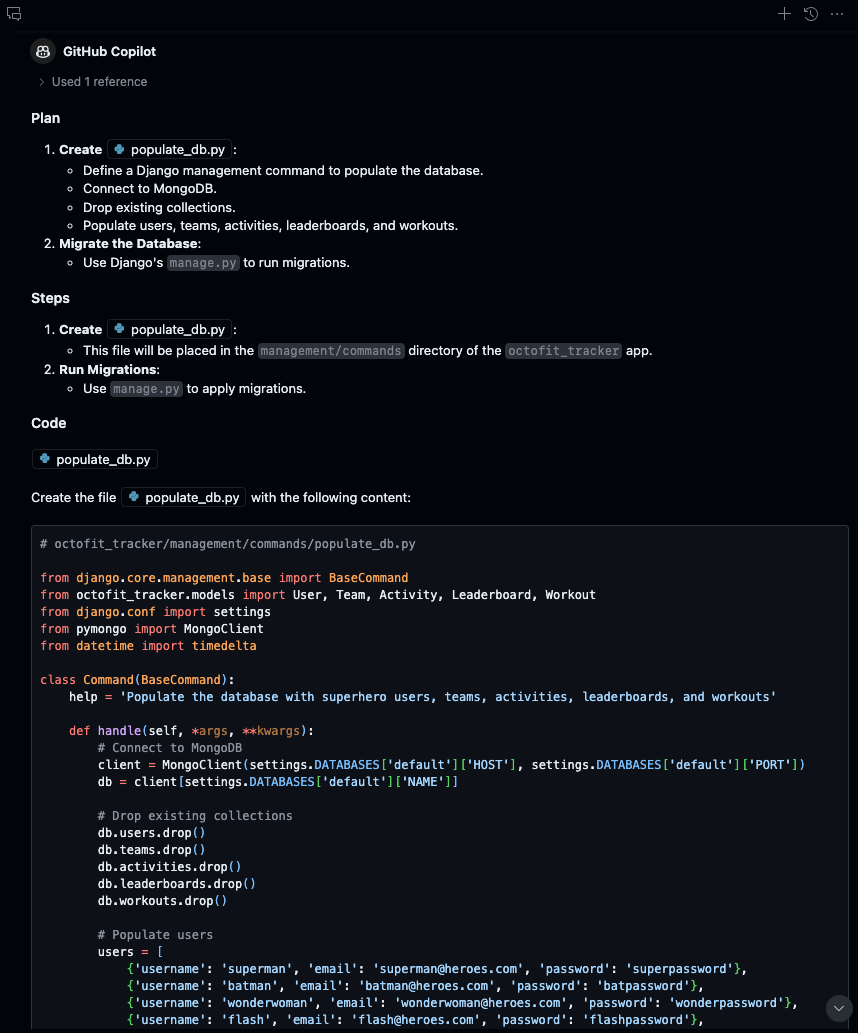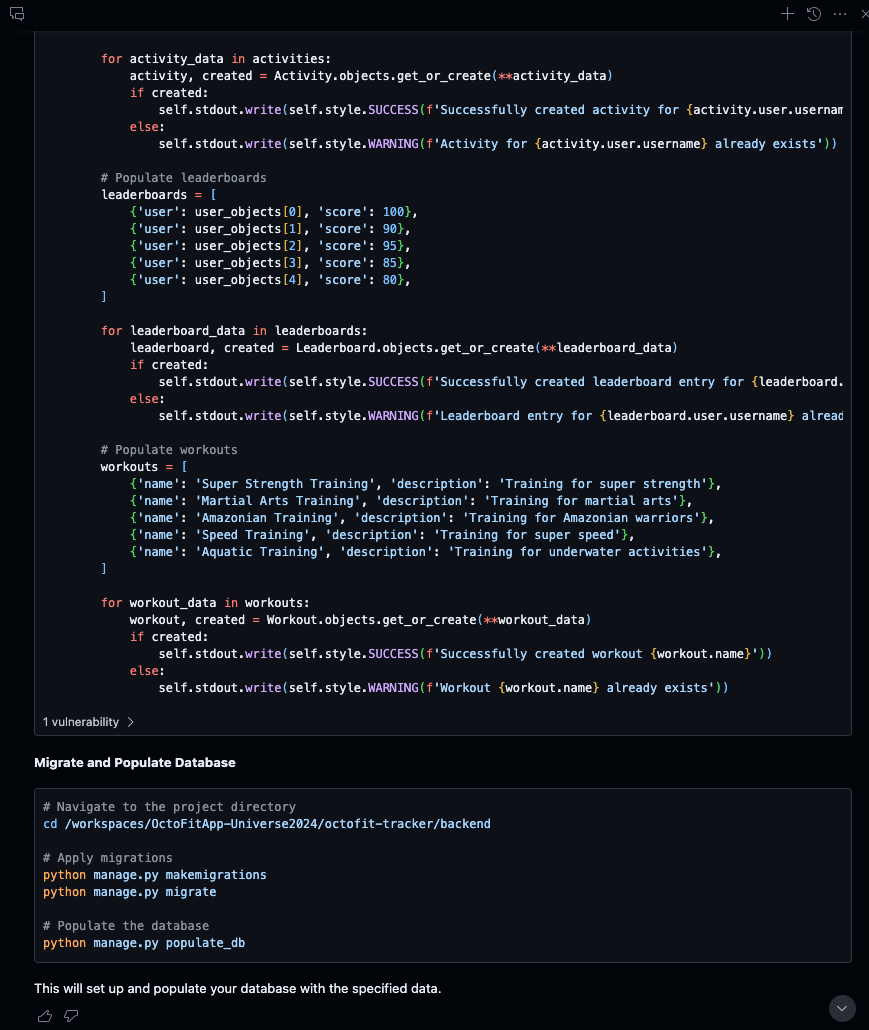OctoFitApp-Universe2024
Populate the database with sample data
Example of not being specific
NOTE: This is an example of not being specific skip this prompt and go to the next one
Let's use manage.py to get everything setup we need to populate_db command include steps to migrate as well
Example of not being specfic in prompting Copilot Chat

Example of being more specific in our prompt
Let’s be more specific and ask Copilot to update the output with the octofit_tracker app name
Type the following prompt in GitHub Copilot Chat:
Let's use manage.py to get the database setup and populated based on fields in models.py
- Create populate_db.py as a manage.py command so it initializes and deletes previous data and recreates it
- populate_db.py creates users, teams, activity, leaderboard, and workouts
- users will be super hero users
- Include steps to migrate in the octofit_tracker project



Commands to create the directory structure for populate_db.py
mkdir -p octofit-tracker/backend/octofit_tracker/management/commands
touch octofit-tracker/backend/octofit_tracker/management/__init__.py
touch octofit-tracker/backend/octofit_tracker/management/commands/__init__.py
touch octofit-tracker/backend/octofit_tracker/management/commands/populate_db.py
Sample code for populate_db.py
# FILE: octofit-tracker/backend/octofit_tracker/management/commands/populate_db.py
from django.core.management.base import BaseCommand
from octofit_tracker.models import User, Team, Activity, Leaderboard, Workout
from django.conf import settings
from pymongo import MongoClient
from datetime import timedelta
class Command(BaseCommand):
help = 'Populate the database with superhero users, teams, activity, leaderboard, and workouts'
def handle(self, *args, **kwargs):
# Connect to MongoDB
client = MongoClient(settings.DATABASES['default']['HOST'], settings.DATABASES['default']['PORT'])
db = client[settings.DATABASES['default']['NAME']]
# Drop existing collections
db.users.drop()
db.teams.drop()
db.activity.drop()
db.leaderboard.drop()
db.workouts.drop()
# Populate users
users = [
{'username': 'superman', 'email': 'superman@heroes.com', 'password': 'superpassword'},
{'username': 'batman', 'email': 'batman@heroes.com', 'password': 'batpassword'},
{'username': 'wonderwoman', 'email': 'wonderwoman@heroes.com', 'password': 'wonderpassword'},
{'username': 'flash', 'email': 'flash@heroes.com', 'password': 'flashpassword'},
{'username': 'aquaman', 'email': 'aquaman@heroes.com', 'password': 'aquapassword'},
]
user_objects = []
for user_data in users:
user, created = User.objects.get_or_create(email=user_data['email'], defaults=user_data)
user_objects.append(user)
if created:
self.stdout.write(self.style.SUCCESS(f'Successfully created user {user.username}'))
else:
self.stdout.write(self.style.WARNING(f'User {user.username} already exists'))
# Ensure all user objects are saved
for user in user_objects:
user.save()
# Populate teams
teams = [
{'name': 'Justice League', 'members': [user_objects[0], user_objects[1], user_objects[2], user_objects[3], user_objects[4]]},
]
for team_data in teams:
team, created = Team.objects.get_or_create(name=team_data['name'])
if created:
for member in team_data['members']:
team.members.add(member)
self.stdout.write(self.style.SUCCESS(f'Successfully created team {team.name}'))
else:
self.stdout.write(self.style.WARNING(f'Team {team.name} already exists'))
# Populate activity
activities = [
{'user': user_objects[0], 'activity_type': 'Flying', 'duration': timedelta(hours=1)},
{'user': user_objects[1], 'activity_type': 'Martial Arts', 'duration': timedelta(hours=2)},
{'user': user_objects[2], 'activity_type': 'Training', 'duration': timedelta(hours=1, minutes=30)},
{'user': user_objects[3], 'activity_type': 'Running', 'duration': timedelta(minutes=30)},
{'user': user_objects[4], 'activity_type': 'Swimming', 'duration': timedelta(hours=1, minutes=15)},
]
for activity_data in activities:
activity, created = Activity.objects.get_or_create(**activity_data)
if created:
self.stdout.write(self.style.SUCCESS(f'Successfully created activity for {activity.user.username}'))
else:
self.stdout.write(self.style.WARNING(f'Activity for {activity.user.username} already exists'))
# Populate leaderboard
leaderboards = [
{'user': user_objects[0], 'score': 100},
{'user': user_objects[1], 'score': 90},
{'user': user_objects[2], 'score': 95},
{'user': user_objects[3], 'score': 85},
{'user': user_objects[4], 'score': 80},
]
for leaderboard_data in leaderboards:
leaderboard, created = Leaderboard.objects.get_or_create(**leaderboard_data)
if created:
self.stdout.write(self.style.SUCCESS(f'Successfully created leaderboard entry for {leaderboard.user.username}'))
else:
self.stdout.write(self.style.WARNING(f'Leaderboard entry for {leaderboard.user.username} already exists'))
# Populate workouts
workouts = [
{'name': 'Super Strength Training', 'description': 'Training for super strength'},
{'name': 'Martial Arts Training', 'description': 'Training for martial arts'},
{'name': 'Amazonian Training', 'description': 'Training for Amazonian warriors'},
{'name': 'Speed Training', 'description': 'Training for super speed'},
{'name': 'Aquatic Training', 'description': 'Training for underwater activity'},
]
for workout_data in workouts:
workout, created = Workout.objects.get_or_create(**workout_data)
if created:
self.stdout.write(self.style.SUCCESS(f'Successfully created workout {workout.name}'))
else:
self.stdout.write(self.style.WARNING(f'Workout {workout.name} already exists'))
Run the following commands to migrate the database and populate it with data
cd octofit-tracker/backend
python manage.py makemigrations
python manage.py migrate
python manage.py populate_db
GitHub Copilot Chat commands to help debug issues
/help
#selection - The current selection in the active editor
#codebase - Searches through the codebase and pulls out relevant information for the query.
#editor - The visible source code in the active editor
#terminalLastCommand - The active terminal's last run command
#terminalSelection - The active terminal's selection
#file - Choose a file in the workspace
| :arrow_backward: Previous: The OctoFit Tracker database and app backend creation | Next: Using the Codespace endpoint to access the Django REST Framework :arrow_forward: |